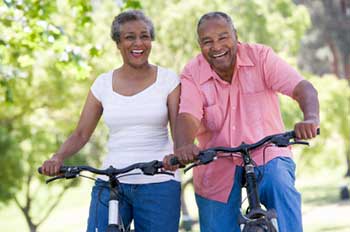More Health and Nutrition Bites
Related
Another reason to avoid added sugar
Because I'm an advocate of avoiding processed foods and sugary drinks, I don't spend a lot of time talking specifically about added sugars. Yet the average American drinks enough soda - between 45 and 50 gallons of it per person - to consume about 39 pounds of sugar a year.
Kids Enjoy the Low-Fat Version, Too
Helping overweight children lose weight is tricky. Not only do they need a certain amount of excess calories to foster healthy growth, but as any parent will tell you, small children like to eat things that taste good to them, and they won't eat things that don't taste good.
Sugar-Sweetened Beverages Affect More than Kids' Weight
You're probably well aware that drinking sugar-sweetened beverages like sodas or sweetened fruit juices can lead to overweight or obesity through the additional calories they contain. And you're probably also well aware that those who are overweight or obese are at an increased risk of health problems ranging from diabetes to heart disease to cancer.
Health & Nutrition Bites
Get the latest health and diet news - along with what you can do about it - sent to your Inbox once a week. Get Dr. Gourmet's Health and Nutrition Bites sent to you via email. Sign up now!
Exercise because it's fun

As you know, you can lose weight just by cutting calories, but it's much easier to lose weight if you diet and exercise. The trick for many people, however, is that exercise makes them hungry - and so they eat more than they should. But not everyone does - there is research to show that some people are less hungry after exercise. Why?
Researchers in Germany suspected that the difference was not only physiological - that there was some psychological or behavioral piece that also affected whether people wanted to eat after exercise or not. To test their theory they looked at what happened when people performed a standardized exercise that was labeled in two different ways (Appetite 2014;81:1-7).
They recruited 96 healthy men and women, both students and employees, from their university to participate in their study on exercise. Each participant was randomly assigned to one of two different forms of exercise: either a "fat-burning" workout or an "endurance" workout. Unbeknownst to the participants, both workouts were exactly the same, being a 20-minute, low-to-moderate-intensity session on a stationary bicycle while their heart rate was monitored.
After the workout the participants were shown to another room where they were asked to respond to a questionnaire. Water was provided and they were also offered a snack in the form of a large bowl of pretzels from which they could eat as much as they wanted. The questionnaire asked the participants to estimate how many calories they had burned as well as what percentage of those calories they believed to be in the form of fat. They also answered questions about their attitudes toward exercise in general and how they felt about the exercise they had just performed.
On average, the participants burned about 96 calories during their 20-minute exercise period. And on average, they consumed about 137 calories of pretzels (the bowl of pretzels was weighed before and after each participant to determine the number of calories they consumed).
Those who exercised under the "fat-burning" label believed that they had burned a larger percentage of the calories as fat during their exercise than did those who exercised under the "endurance" label - even though both groups exercised about the same amount. Conversely, those in the endurance group thought they had burned more calories as carbohydrates.
The researchers then looked at the participants' responses to the questions about attitudes toward exercise and found that those who were less likely to self-impose exercise (because it is "good for them," perhaps, or in order to lose weight) and who did not experience exercise as enjoyable tended to eat more post-exercise. This effect was particularly strong when the exercise was labeled as "fat-burning."
On the other hand, those who were more likely to self-impose exercise actually tended to eat less, while those who found exercise more enjoyable also tended to eat less.
What this means for you
It's important to exercise if you are physically able (and here are some ideas if you are disabled), but choose something that you'll enjoy, not something that you feel is a chore. You'll stick with it and be happier, too.
First posted: July 9, 2014
